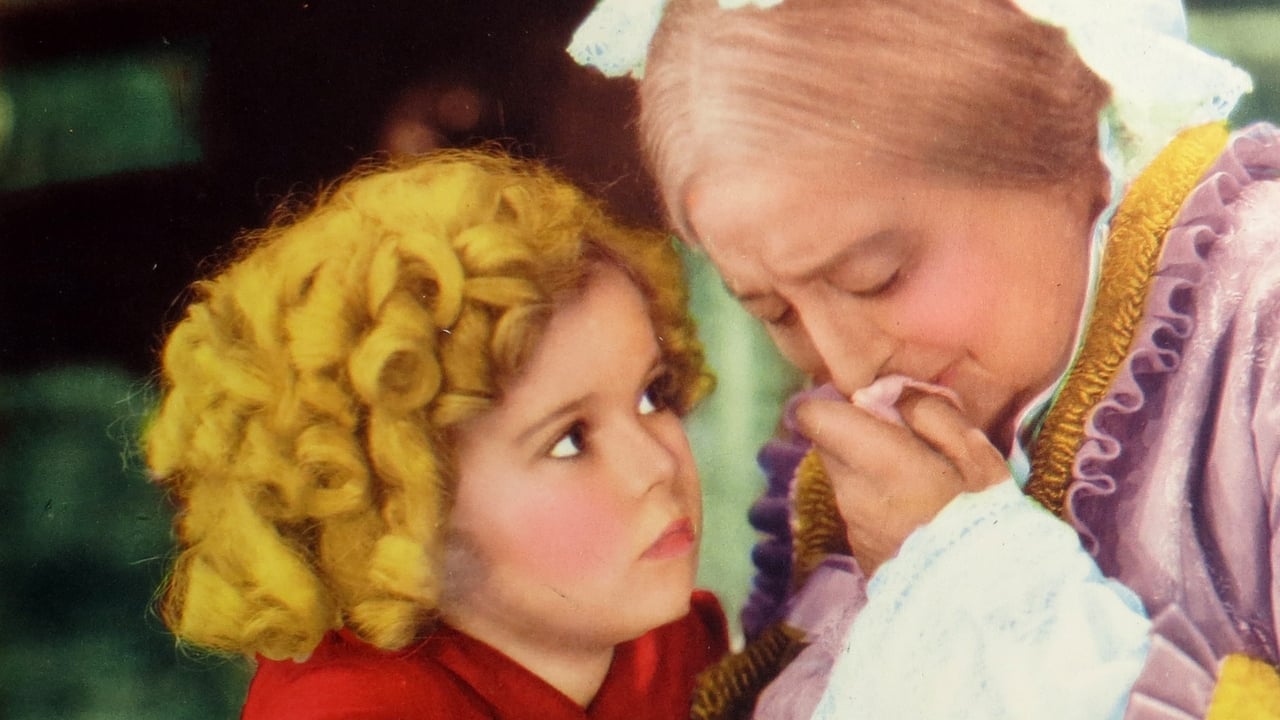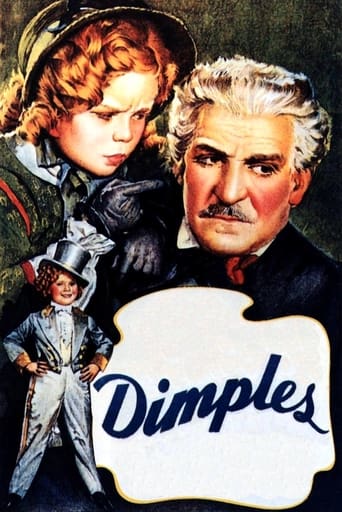

People are voting emotionally.
... View Moreif their story seems completely bonkers, almost like a feverish work of fiction, you ain't heard nothing yet.
... View MoreOne of the best movies of the year! Incredible from the beginning to the end.
... View MoreThrough painfully honest and emotional moments, the movie becomes irresistibly relatable
... View MoreFor this Shirley Temple feature Frank Morgan was borrowed from MGM and worked awfully hard to keep America's favorite moppet from stealing the whole film. Morgan was no mean scene stealer himself.A lot of his Professor Marvel aka known as the Wizard over in Oz went into Morgan characterization of the Professor who is Shirley's grandfather. He's a former actor who has seen his better days and now lives hand to mouth. Shirley and her street peers and an integrated group of peers they are distract the crowd while he pilfers their pockets.I won't say how but Shirley comes to the attention of society matron Helen Westley who offers to adopt her. At the same time she's got a nephew Robert Kent who wants to enter that most ignoble of professions, being an actor. She won't hear of it, especially his adaption of that current best seller Harriet Beecher Stowe's Uncle Tom's Cabin.These two issues meet and are resolved in the finale. Though we're never sure whether Frank Morgan will end his thieving ways. It's practically an addiction now.Morgan and Temple made a good team on screen. Their scenes are almost a dress rehearsal for his role in The Wizard Of Oz.
... View MoreWARNING: Several blackface musical numbers are included. If sensitive to such, best not to view this film or close your eyes during these portions. Our story takes place in 1852 in NYC. The screenplay is driven by several conflicts, There's the conflict between wealthy Mrs. Drew and her nephew Allen over the worth of plays and actors. Allen, who is interested in theater, and in marrying an actress, gets no financial help from Drew for his theater projects. Furthermore, she says if he persists in marrying an actress, he will not then be welcome into her house. Allen also has to decide definitely which actress he wants to marry, as he has recently changed his mind several times.The major conflict is between Shirley's desire to obtain the finer things in life and an education , by living with Mrs. Drew, or to continue living with her grandfather "The Professor", in his apartment in the slums, where there are lots of kids and dogs to play with and perform street entertainment for change. Mrs. Drew offers $5000. to "buy" Shirley. The Professor initially rejects this temping offer, but later accepts it to replace the $800. he lost on an antique swindle he fell for that was supposed to pay for the startup of a show: "Uncle Tom's Cabin". But Shirley finds she's very lonely without her grandfather, her dog, and the neighbor kids to play with. She suggests that her grandfather marry Mrs. Drew as the obvious solution, but this isn't taken seriously. Thus, The Professor gives back the $5000., but sells her his worthless "antique" watch for $1000., enough to cover his debt. Too late, she asks an antique expect, who tells her it's worthless. She calls for police to arrest him. They find him functioning as the director's aid in a performance of "Uncle Tom's Cabin". He dons blackface and extra clothes for Uncle Tom, and goes out on the stage when cued, but the real Uncle Tom player goes on the stage at the same time. He is caught; however, Mrs. Drew decides to stay for the rest of the show. She's very impressed with the play, and especially Shirley's part(Elyza)in it, and changes her mind about the worth of plays and actors. This may mean that Allen can get married to an actress without her disapproval. Also, she drops the swindle charge against The Professor , deciding that the $1000. she lost was worth it. The Professor kisses her neck, suggesting the possibility of a marriage, as Shirley hoped....Helen Westley, who played Mrs. Drew, was generally pleasant in her role when not forced to sponsor plays or when being swindled. She played matronly authoritarians mostly, and is an important character in 3 other S.T. films.The film begins with a street performance by Shirley and the neighbor kids, singing and dancing to "Hey, What did the Blue Jay Say?" Later, Shirley , along with 2 African Americans, dance to "He was a Dandy". When Shirley is considering leaving her grandfather, she sings "Picture Me Without You".. Later, she sings the African American spiritual "Get on Board", with a blackface chorus behind her. The minstrel show after the play consists of Shirley singing and dancing in front of a large chorus of men in blackface, at least one of whom: Stepin Fetchit was an African American in blackface! The song was Dixie-anna, quite catchy for a show song.
... View MoreCan you imagine Shirley Temple as one of the Bowery Boys? Well, here in 1852, she plays a ragamuffin street entertainer being raised by a pickpocket grandfather (lovable Frank Morgan). Dimples gets the attention of an aging society matron (equally lovable Helen Westley) who, for some reason, has a hatred of the theater and everything that it stands for. Her nephew (Robert Kent) wants to put on a Broadway production of "Uncle Tom's Cabin" and use Dimples for the role of Little Eva. Desperate for money after being cheated into buying a fake watch for $800 of the show's money, Morgan agrees to let Westley take Temple in for $5000.00. Eventually, he sells HER the fake watch for $1000 and stays on with her to be with Shirley. The show goes on but when Westley finds out that the watch was fake, she tries to have Morgan arrested. But then she sees Temple on stage dying as Little Eva and has to face both her hatred towards the theater and her decision to imprison Temple's grandfather.It's a predictable story with a few musical moments, including a minstrel show at the end that might raise a few eyebrows. But that was life in Hollywood in the 30's, and producers didn't think about who they might offend then, let alone the future. Add Stepin Fetchit as Westley's servant, and you have double the offense for some audiences.Minus this socially unaware concept fortunately gone (but available to be seen to show how wrong it was), "Dimples" is a cute little film that was made during Temple's heyday as Box Office gold. She's always been a little too cutesy pie for my tastes, but I can understand how late depression audiences could take her into their hearts as a sign of hope for the future. I much prefer the talents of the veterans here, Frank Morgan and Helen Westley, who manage to avoid being background furniture when sharing scenes with her. They are adorable. Here, they are the type of grandparents many audiences could relate to or desire for their own. Morgan, rascally yet undeniably charming, and Westley, somewhat cranky, but oh, that heart of gold, are well paired here. Both had very long careers in films, and Westley seems to have been overlooked as a major character player. She could play gruff characters like Parthy in 1936's "Show Boat" or be lovable like the blind grandmother opposite Temple in "Heidi". Try not to fall in love with her here or in the 1937 Loretta Young screwball comedy "Cafe Metropole". She's also wonderful in the 1934 version of "Anne of Green Gables".While not outstanding, "Dimples" is still quite likable in spite of its shortcomings. Overlook the bad taste of black-face and stereotypes and a cute little film emerges.
... View MoreParents should not allow their small children to watch Dimples any more than they should allow them to watch excessively violent, sexually explicit or profane movies, as they would be exposed to egregious stereotypes of Black people. The movie should be viewed by students of film, sociology and American history so they might have a better understanding of the negative, demeaning attitudes toward Blacks so prevalent in the U.S. until relatively recently, traces of which still exist. The picture has Stepin Fetchit playing a servant to Frank Morgan as if he has an IQ of 10. It has a "play-within-a play" performance of scenes from Uncle Tom's Cabin featuring Whites in ludicrous black-face complete with white sugar donut lips. It's ironic that the novel Uncle Tom's Cabin was intended as an abolitionist work, and indeed did arouse sympathy for Blacks, (so much so that President Lincoln called its author, Harriet Beecher Stowe, "The little lady who started the Civil War") while this movie, in which Uncle Tom's Cabin plays a prominent part, is, by enlightened standards, crudely racist.If you can overlook the above racism, and I I'd like to know who can, Shirley Temple is adorable as usual, dancing wonderfully, though her singing voice, albeit cute, leaves something to be desired, as always. Frank Morgan gives an admirable performance as a charming con man thief.But, all in all, Dimples is a children's movie that is no longer, if it ever was, suitable for children. If you doubt this, Just picture the Obamas screening it for their daughters.
... View More